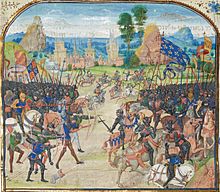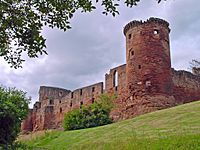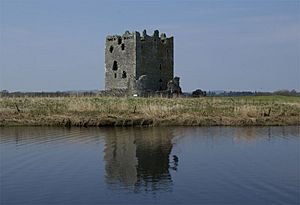Archibald Douglas, 3rd Earl of Douglas facts for kids
Quick facts for kids
Archibald Douglas
|
|
|---|---|
| Lord of Galloway Earl of Douglas Earl of Wigtown Lord of Bothwell |
|
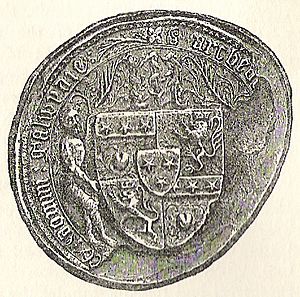
Seal of Archibald Douglas
|
|
| Predecessor | James Douglas, 2nd Earl of Douglas |
| Successor | Archibald Douglas, 4th Earl of Douglas |
| Born | 1330 Scotland |
| Died | 24 December 1400 Threave Castle |
| Buried | 1400 Bothwell |
| Noble family | Clan Douglas |
| Spouse(s) | Joanna de Moravia, Lady of Bothwell |
| Issue | Archibald Douglas, 4th Earl of Douglas James Douglas, 7th Earl of Douglas Marjorie Douglas Helen Douglas Sir William Douglas of Nithsdale (illegitimate) |
| Father | Sir James Douglas |
| Mother | unknown |
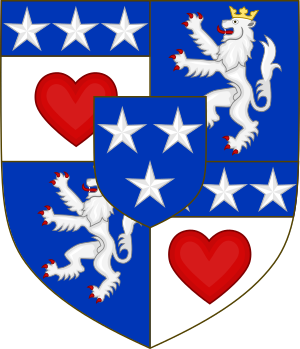
Archibald Douglas (around 1330 – December 24, 1400) was an important Scottish nobleman. He was known as Archibald the Grim or Black Archibald. He became the Earl of Douglas and Lord of Galloway.
Archibald was the son of Sir James "the Black" Douglas. Sir James was a trusted leader for King Robert I. Archibald inherited the Earldom of Douglas. This happened after his cousin, James, 2nd Earl of Douglas, died without children at the Battle of Otterburn.
Contents
Archibald's Early Life and Family
Archibald was likely born after his father died fighting in a crusade in Spain. Some people described him as "dark and ugly." However, a writer named Jean Froissart said Archibald was a large man. He could even use a very big sword.
Young Archibald might have spent time in France with his cousin William. They were at the court of King David II, who was in exile. They joined the French king's service. This was part of the Auld Alliance, a long friendship between Scotland and France. Archibald is first mentioned in records in 1342. He was listed as an heir to the Douglas lands.
What Happened at the Battle of Poitiers?
Archibald first became well-known in 1356. He was captured by the English at the Battle of Poitiers. He had gone to France with his cousin, William. They wanted to help King John II of France fight the English.
The battle was a big loss for the French. King John II was captured. Many other nobles were also taken prisoner, including Archibald. Archibald's armor was very fancy. This made the English think he was a valuable prisoner.
How Did Archibald Escape?
Archibald escaped from the English in 1356. Sir William Ramsay of Colluthie helped him. Ramsay was also a prisoner. In front of a guard, Ramsay pretended to be angry with Archibald. He accused Archibald of stealing his cousin's armor. Ramsay then demanded Archibald take off his boots.
As Archibald removed one boot, Ramsay started hitting him with it. A guard stepped in, saying Archibald was from a noble family. Ramsay replied, "He is a scullion and a rogue!" He told Archibald to find his master's body among the dead. Ramsay paid a small fee, the ransom for a low-ranking soldier. Archibald then returned to Scotland. This meant the English did not get a large ransom for him.
Archibald's Rise to Power
Archibald became the Constable of Edinburgh Castle by 1360. He also became the Sheriff of Edinburgh. He held these important jobs until 1364. That year, he was made Warden of the Western March. This was a tough job because the English controlled much of that area.
In the following years, Archibald led many attacks against the English. By 1368, he was the Lord Warden of the Marches. He successfully pushed the English out of Annandale by 1383.
His Important Marriage
Archibald gained more power through his marriage in 1362. He married Joanna de Moravia. She was a wealthy widow and heiress. Joanna brought many large estates across Scotland with her. These included the partly ruined Bothwell Castle. Archibald quickly began to rebuild it.
This marriage was arranged by the king. It made sure the Moray family's lands went to a loyal person. Joanna's estates stretched from northern Scotland to the south. This marriage helped Archibald become even more powerful.
Diplomatic Missions
Archibald went on two important trips to France. He traveled there in 1369 and again in 1371. The first trip was to object to a complaint made by Queen Margaret. The second trip was to renew the Auld Alliance. This alliance was a friendship between Scotland and France. This led to the Treaty of Vincennes. It was the first time the alliance was officially confirmed in 55 years.
Becoming Lord of Galloway
In 1369, King David made Archibald the Lord of Galloway. This was because he worked hard to remove the English from the area. Galloway was a difficult region to control. Its people had their own laws and customs. They did not always feel loyal to the Scottish king.
By 1372, Archibald had full control of Galloway. He also gained the Earldom of Wigtown. This meant he was the first person since 1234 to control all of Galloway. His power over Galloway was shown on his official seal. It showed two "wild men" holding up his coat of arms.
In 1378, Archibald's nephew, Alexander Ramsay, captured Berwick. The English quickly surrounded the town. Archibald gathered an army to help. His army was much smaller than the English force. However, Archibald still marched towards Berwick.
The English army followed Archibald to Melrose. A battle began there. Archibald's army was reinforced and won. The English leader, Musgrave, was captured. The remaining English soldiers fled back to Berwick.
Around this time, Archibald began building his castle at Threave Castle. He also supported Sweetheart Abbey by building a hospital. He lived at Kirkcudbright while Threave Castle was being built. Archibald's land holdings now matched or even surpassed his cousin William's.
Archibald Becomes Earl of Douglas
In 1384, William, the first Earl of Douglas, died. His son, James Douglas, 2nd Earl of Douglas, took over. But James was killed four years later at the Battle of Otterburn in 1388. Archibald then inherited the earldom and all the Douglas lands. This made him the most powerful noble in Scotland.
During times of peace with England, Archibald enforced laws on the border chiefs. He created special rules for the border areas. The power of the Black Douglas family grew very strong. It even overshadowed the weak rule of King Robert III.
Archibald also strengthened his family's ties to the royal family. In 1390, he arranged for his son, Archibald, to marry Princess Margaret. She was King Robert III's daughter. In 1399, his daughter Marjorie married David Stewart, Duke of Rothesay. Rothesay was the king's son and heir to the throne.
In 1390, Archibald also captured Lochnaw Castle.
His Death
Archibald Douglas died at Threave Castle around Christmas in 1400. He was buried at Bothwell.
Family Life
Around 1362, Archibald Douglas married Joanna de Moravia. She was the daughter of Maurice de Moravia. They had five children:
- Archibald Douglas, who became the 4th earl.
- James Douglas, who later became the 7th earl.
- Marjorie Douglas, who married David Stewart, Duke of Rothesay and then Walter de Haliburton.
- Helen Douglas, who married George de Lawedre of Haltoun.
- Eleanor Douglas, who married John de Dundas.
Archibald also had a son born outside of marriage:
- Sir William Douglas of Nithsdale (died 1391), who married Egidia Stewart, daughter of King Robert II.
| Peerage of Scotland | ||
|---|---|---|
| Preceded by James Douglas |
Earl of Douglas 1388–1400 |
Succeeded by Archibald Douglas |
 | Aaron Henry |
 | T. R. M. Howard |
 | Jesse Jackson |


